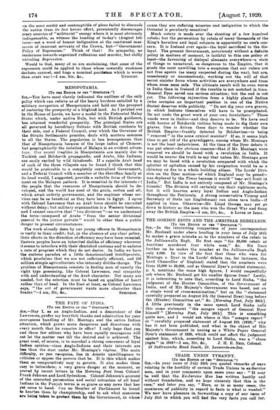THE FATE OF INDIA.
(To THE EDITOR OF THE " SPECTATOR.") •
BIL—May I, as an Anglo-Indian, and a descendant of the Lawrences, proffer my heartfelt thanks and admiration for your courageous handling of Mr. Montagu and the entire Indian situation, which grows more dangerous and disastrous with every month that he remains in office? I only hope that you and those few editors who have been equally courageous will not let the matter rest till the desired end is achieved. The great need, of course, is to marshal a strong ooncensus of loyal Indian opinion—since Anglo-Indians and their interests are less than the dust under Mr. Montagu's regime. The main difficulty, as you recognize, lies in Asiatic unwillingness to criticize or oppose the powers that be. It is this which makes them so comparatively easy to govern. It also makes them easy to intimidate; a very grave danger at the moment, as proved by recent letters in the Morning Post from Colonel Frank Johnson and Lord Sydenham. Colonel Johnson's account of the concerted persecution and social ostracism of all loyal Indians in the Punjab towns is as grave as any news that has yet come to hand. Can no Member of Parliament be found to hearten them by championship, and to ask what measures are being taken to protect them by the Government, in whom
cause they are suffering miseries and indignities to which the Oriental is peculiarly sensitive?
Much outcry is made over the shooting of a few hundred rebels; but the persecution by rebels of many thousands of the King's harmless and loyal subjects is apparently no one's con- cern. It is Ireland over again—the loyal sacrificed to the dis- loyal. The present Government., notoriously without a definite policy in matters of moment, is faithful to this one volley at least—the favouring of disloyal elements everywhere—a state of things so unnatural, so dangerous to the Empire, that it goads the most unwilling into a suspicion that our rulers are not free agents (as many suspected during the war), but are, consciously or unconsciously, working out the will of that secret sinister force whose activities are everywhere and from whom none seem safe. The ultimate result will be even worse in India than in Ireland if the trouble is not scotched in time. General Dyer /saved one serious situation; but the end is not yet. The following injunction from a highly placed Indian (who occupies an important position in one of the Native States) deserves wide publicity. "Do not dig your own graves, in which Indians themselves will have to be precipitated. Do not undo the great work of your own forefathers." These words were in italics—and they deserve to be. We have read with horror of Bolshevik victims being made to dig their own graves. One is driven these days to w!onder whether the British Empire—frankly detested by Bolshevism—is being "
removed" in the same cynical manner? If so, it seems high time to get rid of the gravediggers, among whom Mr. Montagu is not the least industrious. At the time of the Dyer debate it was put about—for obvious reasons—that if Mr. Montagu were removed we should be faced with a revolution in India. It would be nearer the truth teeny that unless Mr. Montagu goes we may be faced with a revolution compared with which the splutter of agitation caused by his resignation would be as a chimney on fire to a whole building ablaze. The Lords' Divi- sion on the Dyer motion—of which England may be proud— was deplored by the Times because it would "bear evil fruit in India." But India is not entirely composed of Mr. Montagu's friends! The division will certainly vex their righteous souls, but it will hearten every loyal Indian and Anglo-Indian throughout the Peninsula. A strong conservative Viceroy and Secretary of State (an Englishman) can alone save India—if applied in time. Otherwise—Mr. Lloyd George may yet go down to history as the man who won the Great War and flung away the British Bmpire.—I am, Sir, &o., A Loven or INDIA.


































 Previous page
Previous page